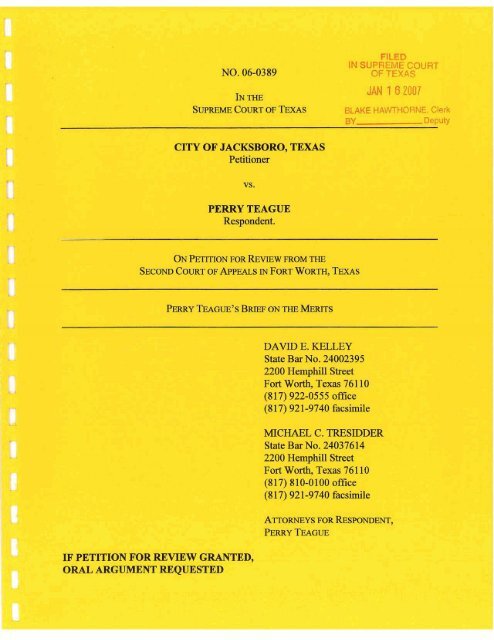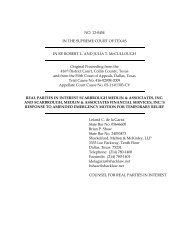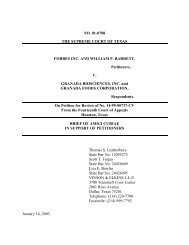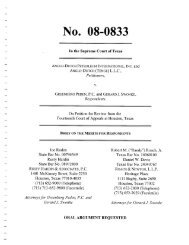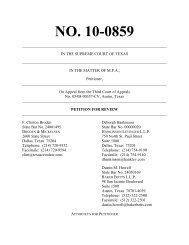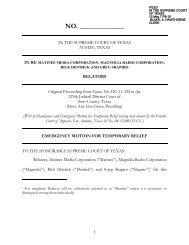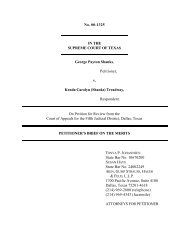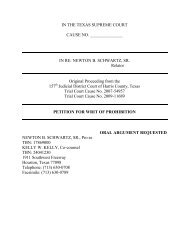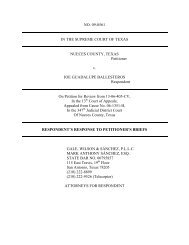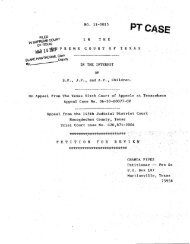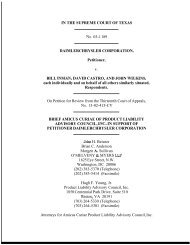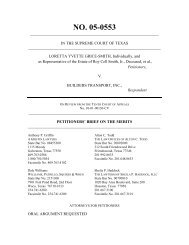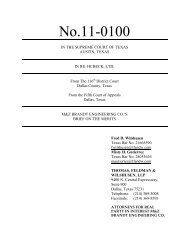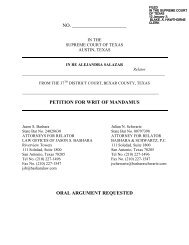Create successful ePaper yourself
Turn your PDF publications into a flip-book with our unique Google optimized e-Paper software.
NO. 06-0389<br />
CITY OF JACKSBORO, TEXAS<br />
Petitioner<br />
_ ._ _ - _ __-__ ---_- ---<br />
PERRY TEAGm<br />
R-.<br />
_______.__ - _- -__ ---<br />
IF PETITION FOR REVLEW G-D,<br />
ORAL ARGUMENT REQUESTED<br />
DAVID E. KELLEY<br />
State Bar No. 24002395<br />
2200 Hemphill StrPret<br />
Fat Wd, <strong>Texas</strong> 761 10<br />
(8 1 7) 922-0555 <strong>of</strong>fice<br />
(8 17) 921-9740 facsimile<br />
MICHAEL C. TRESIDDER<br />
State Bar No. 2403 76 14<br />
2200 Hemphill Street<br />
Fort Wmfh, <strong>Texas</strong> 761 10<br />
(817) 810-0100 <strong>of</strong>fim<br />
(817) 921-9740 hcshile
IDENTITY OF PARTIES AND COUNSEL<br />
The following is a complete list <strong>of</strong> all parties, as weU as the mes and addresses <strong>of</strong><br />
all counsel:<br />
PARTIES:<br />
Respondent:<br />
PERRY TEAGUE<br />
Respondeat's Trid and Appellate Counsel;<br />
DAVID E. KELLEY<br />
State Bar No. 24002395<br />
, , - , --- -. -- --. -- - .. -- -- -- - - ----- -- --- 220-_sbre&--<br />
Fort Worth, <strong>Texas</strong> 761 10<br />
(817) 922-0555 <strong>of</strong>fiw<br />
(817) 921-9740 facsimile<br />
-. -<br />
MICHAEL C. TRESXlDDER<br />
State Bar No. 24037614<br />
2200 Hempbill Street<br />
Fort Worth, Tens 761 10<br />
(81 7) 810-0100 <strong>of</strong>fice<br />
(817) 921-9740 facsimile
Petitioner:<br />
CITY OF JACKSBORO<br />
Petitioner's <strong>Supreme</strong> <strong>Court</strong> Counsel:<br />
KWT R. KUHN<br />
State Bar No. 24002433<br />
VIRGINIA K. HOELSCHER<br />
State Bar No. 24041108<br />
BROWN MCCARROLL,<br />
L.L.P.<br />
1 1 1 Congress Avenue, Suite 1400<br />
Austin, <strong>Texas</strong> 78701<br />
(5 f 2) 479-9746 <strong>of</strong>fice<br />
(5 12) 479-1 101 facsimile<br />
Petitioner's Trial and <strong>Court</strong> <strong>of</strong> Appd<br />
ComseI:<br />
BONNIE LEE GOLDSTEIN<br />
BONNIE LEE GOLDSTEIN, P.C.<br />
State Bar No. 08097975<br />
P.O. Box 140940<br />
Dallas, <strong>Texas</strong> 75214<br />
(214) 321-3668 <strong>of</strong>fi~<br />
(2 14) 32 1 -8429 facsimile<br />
DAVID SPILLER<br />
SPILLER & S P r n<br />
State Bar No. 18934950<br />
P.O. Drawer 447<br />
JmksBoro, <strong>Texas</strong> 76458<br />
(940) 567-6644 <strong>of</strong>fice<br />
(940) 567-3999 fawide
TABLE OF CONTENTS<br />
D m OF PARTLES AND COUNSEL.. ..................................................................... u<br />
TABLE OF CONTENTS ..................................................................................................... iv<br />
'INDEX OF AUTHORITIES ............................................................................................... .vi<br />
ISSUES PRESmmD ...............................*..................*...............................*........................ X<br />
STATEMENT OF FACTS. .................................................................................................... 1<br />
SUMMARY OF ARGUMENT.. ................................. . .............................................. .5<br />
Tewgue's petition complied with the clear quimnents <strong>of</strong><br />
Section 2 14.00 12 <strong>of</strong> tfie <strong>Texas</strong> Lo& Government<br />
Code ............................................................................................................... 7<br />
The City and State's interpretation <strong>of</strong> Chapter 2 14 is at<br />
odds with clear statutory hguage .................................... ,.1...,9<br />
Previous holdings <strong>of</strong> this <strong>Court</strong> support <strong>Teague</strong> and the<br />
opinion <strong>of</strong> the court <strong>of</strong> appeals .............................................. 12<br />
City and State's arguments place form <strong>of</strong> pleadings over<br />
their<br />
substance ................................................................................ 15<br />
City and State's proposed htqretation <strong>of</strong> Section<br />
214.0012 would creak serious due<br />
process concms.. .................................................................. 1 6<br />
..
The opinion <strong>of</strong> the court <strong>of</strong> wppeals does not<br />
abrogate the shtutmy appeal process for<br />
a municipality's demotition order through the UDJ%<br />
rather the court specikdy fails to d an evaluation<br />
<strong>of</strong> this sepmte issue .............................................................. 17<br />
Substantial evidence standard is not m issue as them<br />
has never been an evdu&on <strong>of</strong> evidence<br />
in this matter ....................................................... ,...,,.~..........,18<br />
The City waived any alleged reqhent for a request<br />
for writ <strong>of</strong> &&. ............................................................. .I9<br />
11. Teagm is entitled to pursue a suit for iojlmctive and deckatmy<br />
relief outside <strong>of</strong> the statutory scheme on the basis that the cily<br />
ordinance and statutory fmmewurk are mcunstitutiaaal......................... ..*.20<br />
Govemmd immunity is autoddly waived<br />
in suits to enjoin violations <strong>of</strong> state or &ded<br />
constitutional rights.. ............................................................. .2 1<br />
<strong>Teague</strong>'s claims for oo~~onal and dechtory<br />
relief are properly brought under the UIDJA .......................... 22<br />
Tmgue's constitutional d a b are not subject to any<br />
<strong>of</strong> the mbints imposed by Chapter 214 <strong>of</strong> the <strong>Texas</strong><br />
Local Government Code ...................... . .......................... 23<br />
<strong>Teague</strong>'s has rsiised substantid complaints tholt the<br />
city ordinance and underlying statutory scheme are<br />
un-tutlonal. ...%<br />
. ...................................................................<br />
III. Ho1n80mer's due process rights vs. public<br />
concerns ....................................................................................................... 29
CASES<br />
INDEX OF AUTHORITIES<br />
AircraJ& Diesel Egu@. Corp. v. Hirsch, 33 1 U.S. 752 (1947).. .................................... ..26<br />
Board <strong>of</strong> Adjustment <strong>of</strong> Ci@ <strong>of</strong> Sarr Antonio v. Wdlie, 5 1 1 S.W.2d 59 1 (Tex.<br />
App.-San Antonio 1974, writ rerd nr. e. )... ............................ . ........................... ..27<br />
Camatu v. Ah, <strong>Court</strong>, 387 US. 523 (1967) ............................................................... 20,29<br />
Central Puwer h Ligk Co. v. Sharp, 960 S.W.2d 617 (Tex 1997) .................................. 25<br />
Cify <strong>of</strong>h Purtev. B+Zd, 898 S.W= 288,291 (Tex. 1995) .................................... ,..,21<br />
Cow@ <strong>of</strong> Cameron v. Brown, 80 S.W.38 549, 555 vex. 2002) ................................... u...15<br />
Colainey v. Uniwrsi@ <strong>of</strong> TEWS &s., 806 S.W2d 277,284 (Tex. App.<br />
-Fort Worth 1991, wit denied) ............................................................................... 21<br />
Davis v. Zoning Board <strong>of</strong> Adjusment <strong>of</strong>Ci@ <strong>of</strong> La Porte,<br />
865 S.W.2d 941 (Ta 1993) ,. ....12-14<br />
................................ .......................................<br />
Goiden Eagle Archery, Inc, v. Jmhon, 24 S.W.3d 362 (Tex. 2000) ............................... 27<br />
In re <strong>Teague</strong>, 2006 WL 3021 23 vex. App.-Fort W d<br />
Feb. 6,2006, orig. proceeding) .............................................................................. *..4<br />
JB. Advertking Im. v. Sigrr Bd. QfAppeaIs <strong>of</strong> City <strong>of</strong> Carrollton, 883<br />
S.W.2d 443 (Tex. App.-Eastland 1994, writdmied) ....................................... 7,27
Keyishim v . Board <strong>of</strong> Regents. 385 U.S. 589 (1967) .........................................................<br />
Lewis v . Metropolitan Smingx & Loun ASSOC.. 550 S.W.2d 11 (Tex . 1977) ..................... 27<br />
Mbrtimz v . City <strong>of</strong> El Pmo. 169 S.W.3d 4&8<br />
(Te x. App.41 Piso 2005.pet.fiZe4 ........................................................ 14- 15<br />
Nwsbaum v . City <strong>of</strong>Dallas. 948 S.W2d 305<br />
(l%~A.pp.-Dalla~ 1996. no wrif) 13<br />
............................................................................<br />
Old Dearborn Bt. Co . v . Seagram-DistiIters Curp.,<br />
299 U.S. 183 (1936) ................................................................................................ 17<br />
Prostokv . Browning. 112 S.W.3d 876. 915<br />
vex . App.-Dallas, 2003). rev 'd in part m other groundr ................................. 1 5<br />
Smtt v . Board <strong>of</strong> Aaw-t. 405 S.W.2d 55. 56 (T ex. 1966) .............................. .13. 15- 16<br />
State Bar v . Heard, 603 S.W.2d 829. 833 (Te x. 1980) ...................................................... 15<br />
St . Luke 's EpiscopaI Hosp . v. &or3 952 S.W2d 503. 505 (Tex 199 7)<br />
....................<br />
17<br />
10. 1 1<br />
<strong>Teague</strong> v . City <strong>of</strong> Jachboro. 190 S.W.3d 81 3. 820<br />
(Ta App.-Furt Worth 2006.pet . fled) ........................................................ 4 17<br />
T m<br />
Highway Comm 'n v . <strong>Texas</strong> Ass 'n <strong>of</strong> Steel Iwrgor fers. 372 S.W.Zd<br />
525 (T ex. 1963) 21<br />
.......................................................................................................<br />
Tmzs Mum Pwer Agency v . Pub . Util . Cum 'n,<br />
100 S.W.3d 510.51 5.17 (T ex. App.-Austin 2003,p<br />
. denied) . 22
<strong>Texas</strong> Naf . hsme Consetvation Corn v . IT.Pary.<br />
74 S.W.3d 849. 855 (T ex. 2002) ............................................................................. 22<br />
<strong>Texas</strong> State Board <strong>of</strong> Pkarmacy v . Walgreen Tms Co., 520 S.W.2d<br />
845 (T ex. App.-Austin 1975. writ rejued nr . e.) ............ . ........................*. 23-24<br />
Timu Water Corn 'n v . LMq. 850 S.W.2d 183<br />
(Tex.App.-Beaumont 1992. wif hied) ........... . ............................................... 22<br />
Waco LSD . v . Gibson. 22 S.W.3d 849. 850 vex . 2000) .................. . ......................... 16<br />
Yaks v . h4iZwuukee. 77 U.S. 497. 505 (1870) ................................................................... 20<br />
U.S. CONST<br />
S CONSTITUTION . STATWIF-8 AND RULES<br />
. amend XIV. 8 1 ............................................................................................. 20<br />
Tm . COMST . art . V. 8 8 ................... ,. .............................................................................. x<br />
. Crv . mc . & Rm . CODB § 37.00418) .................................................... ... 22, 26<br />
llx . LOC<br />
. GWT CODE # 214.0012 et seq ..................................................................<br />
passim
Nature <strong>of</strong> the Case:<br />
Trial <strong>Court</strong>:<br />
TriuZ <strong>Court</strong> Dispositiop~:<br />
Parties in Cowt <strong>of</strong>Appeals:<br />
<strong>Court</strong> <strong>of</strong> Appals:<br />
STATEMENT OF TEU?, CASE<br />
This case involves the requisites necessary for a citizen<br />
to appeal a municipal demolition order under Chapter<br />
2 14 <strong>of</strong> the <strong>Texas</strong> Local Government Code.<br />
Additionally, this case involves a citizen's ability,<br />
independent <strong>of</strong> the staturn framework, to challenge<br />
the constitutionality <strong>of</strong> the underlying city ordinance or<br />
statute. FoIlowhg the issuance <strong>of</strong> a demolition order<br />
for his home by the City, <strong>Teague</strong> filed a vefied<br />
petition appealing the City's order under Chapter 214<br />
and also challenging the comtitutidty <strong>of</strong> the city<br />
ordinance and the statutory framework outside the<br />
statutory process.<br />
The Honorable John H. Fostel, 27 1"' Judicial District<br />
<strong>Court</strong>, Jack County, <strong>Texas</strong>.<br />
On January 26,2006, the trial court granted the Cify's<br />
plea to the jurisdiction and dismissed <strong>Teague</strong>'s lawsuit<br />
for 1 a& <strong>of</strong> subject matter jurisdiction.<br />
Plaintiff Perry <strong>Teague</strong> was Appellant. Defendant City<br />
<strong>of</strong> Jacksboro was Appelfee.<br />
Second <strong>Court</strong> <strong>of</strong> Appeds; Justices Livingston,<br />
Dauphin<strong>of</strong> and Holman.<br />
Disposition by Cowt <strong>of</strong> Appeals: In a published opinion authored by Justice Livingston<br />
the court <strong>of</strong> appeals held that Respondent's vded<br />
petition properly complied with Chapter 2 14 <strong>of</strong> the<br />
<strong>Texas</strong> Local Government Code and therefore invoked<br />
the tsial court's subject matter jurisdiction. Therefore,<br />
the court <strong>of</strong> appeals reversed the trial court's judgment<br />
and remanded the case for Mer proceedings.
ISSUES PRESENTED<br />
Does Section 2 14.00 12(b) <strong>of</strong> the <strong>Texas</strong> Local Government Code<br />
w-uire, as a jurisdictional prerequisite, that a party request a writ<br />
<strong>of</strong> certiorari within thirty clays <strong>of</strong> their receipt <strong>of</strong> an order <strong>of</strong> a<br />
dcipality?<br />
No. Section 214.0012@) is clearly didonary on its face, and<br />
not jurisdictional. The stam merely requires that a verified<br />
petition be fled within thirty days. Writs <strong>of</strong> certiorari are wed<br />
to ensure a complete record for widentimy purposes and have<br />
nothing to do with a trial corn's jurisdiction.<br />
Whether a party chdlenging a statute, ordinmce or municipal order<br />
on constitutimd grounds who does not follow that same statutory<br />
kework properly invokes the court's subject matter jurisdiction?<br />
Yes. The mising <strong>of</strong> comthdional issues invokes the Wct<br />
court's jurisdiction. TEX. CONST. art. V, 8 8; TEX. GOV'T CODE 5 24.008;<br />
Tex CW. PMC. & RIM. CODE 5 37.004(a). Furthemore, a party need not<br />
follow the very statute it is clouming is undtuEional in order to invoke<br />
jwidicti<strong>of</strong>l.
STA'IXmNT OF THE FACTS<br />
At the outset <strong>of</strong> its brief, Petitioner, the City <strong>of</strong> ~aclrsboro (herehfk referred to<br />
as the "City 3<br />
') states that the "relevant facts <strong>of</strong> this case are not really in dispute."<br />
Petitiumr 's Brief at 1. To the contrary, there seem to be a fundamental disagreement<br />
regding what constitutes the relevant facts in the current matter. ARer its initial<br />
assertion, the City proceeds to inundate the <strong>Court</strong> with aver six (6) pages <strong>of</strong> evidentiary<br />
assertions in a case which has never reached the evidentiary stage. In f'act, most <strong>of</strong> the<br />
City's factual assertions are disputed and are based upon conclusion and speculation and<br />
have never been <strong>of</strong>fered under the <strong>Texas</strong> Rules <strong>of</strong> Evidence in any adversarial<br />
proceeding. Respondent, Perry <strong>Teague</strong> (hereinafter referred to as "<strong>Teague</strong>") has as yet,<br />
never had the oppodmity to object to, cross-examine, challenge or investigate the<br />
veracity <strong>of</strong> any <strong>of</strong> the city's assertions. (CR at 4). In fact, <strong>Teague</strong>'s extensive efforts in<br />
this litigation are almost entirely focused on his effort to obtain the opportunity to<br />
challenge and object to the one-sided allegations <strong>of</strong> the City. Teagw could easily provide<br />
his own fbtual assertions regarding the status <strong>of</strong> his home (the property at issue), the<br />
alleged illegal actions <strong>of</strong> the City and its agents, or any other number <strong>of</strong> unsubstantiated<br />
allegations in response. However to do so only serves to &tract hm the true issues<br />
before the <strong>Court</strong>.<br />
The only relevant facts relate to the procedural histury <strong>of</strong> this matter and their<br />
relation to jurisdictional issues. The relevant jurisdidd facts are as follows:
On or about December 13,2005, the City held a meeting <strong>of</strong> the city council. (CR at<br />
22). On the agenda <strong>of</strong> the cily council was a public hearkg regarding the abatement <strong>of</strong> a<br />
structure located at 704 N. Main Street, Jorcksboro, Jack County, <strong>Texas</strong>, which was<br />
alleged to be substandard and dangerous. Id The property and st~cture located at 704 N.<br />
Min S m JmIrsboro, Jack County, Tams are owned by <strong>Teague</strong>. Furthermore, <strong>Teague</strong><br />
lived otl the property in question and has declared said property as his horn- pursuant<br />
to <strong>Texas</strong> law. (CR at 3).<br />
During the meeting, a city <strong>of</strong>ficial provided the city council with unsworn<br />
statements alleging that the &u&m located at 704 N Main Street was in violation <strong>of</strong><br />
city ordin8nce(s). (CR at 34). In support <strong>of</strong> lhe city <strong>of</strong>ficial's msworn statements,<br />
utwerified documents were provided to the city council fm its review. (CR at 33). At no<br />
time was the city <strong>of</strong>ficial placed under oath regarding his presentation to the city council.<br />
(CR at 4). Furthermore, <strong>Teague</strong> was not prwided with copies <strong>of</strong>the dammenfation<br />
which the city council used in its dekmimkion <strong>of</strong> whelher to enter a demoIition order for<br />
the structure on said property. Id. During the come <strong>of</strong> the meeting, <strong>Teague</strong> was not given<br />
the qpdmity to cross-examine the unsworn witnesses, d his own witnf~~es, or to<br />
present or defend his case in any meaningful way. Id. Afb the co~lclusiw <strong>of</strong> the<br />
6%&ng," the Mayor signed Order No. D-04-05 ordering <strong>Teague</strong> to demolish Bis home or<br />
that the City would do so within ihkty (30) days. (CR at 71).<br />
Thereafter, Tape fled an Original Petition undApplic&n for Tmporaty
Restraining &&r on January 12,.2UU6 in the 27 l* Judicial DisErict <strong>Court</strong> <strong>of</strong> Jack County,<br />
<strong>Texas</strong>. (CR at 2). As a part <strong>of</strong> his challenge, <strong>Teague</strong> sought to ov- Order No. DM-<br />
05 for the reason tbat the City's conduct and its Order were illegal. (CR at 3-5,8).<br />
Furthermore, <strong>Teague</strong> Wenged the mdedying st&& and ordinance stating that they<br />
violated his state and f&d constiWond due process rim. Id. The trial court issued<br />
a Temporary Restraining Order with a hearing scheduled to take pke on January 18,<br />
2006 to determine whether to continue the Temporary Restraining Order into a<br />
Temporary Iry'umfion. (CR at 1 1- 1 2).<br />
On the date <strong>of</strong> said hearing, the City fled its Lh$edmt City <strong>of</strong> JaBsboro PZea to<br />
the 3khdicti~q SpecicaI keptiom, Uri@+ml h e r to UrrginaI Perition ad Applicafion for Tmp~ary Restraining Or*, Com&rclahlfbr Wmngid Iym~on ad<br />
Motion to DissoZve the Tempormy Restruining &&r. (CR at 19). It is important to note<br />
that this pleading included as attachments dl docu~ents which would be presMlably<br />
.filed in response to a district court's writ <strong>of</strong> certiorari.<br />
Thereafter, on Jmuary 26,2006, the Hmdle John H. Fmtel, Judge <strong>of</strong> the 271'<br />
Judicial District <strong>Court</strong> for Jack County, <strong>Texas</strong> signed an &&r grmtiug the City's plea to<br />
the jurisdiction and dissohing the trial ootlrt's Tvary Restraining Order. (CR at<br />
184-186). Contained within the Or&, the trial court specifically found and concluded<br />
that pursuant to Section 2 14.00 12 <strong>of</strong> the <strong>Texas</strong> Local Government Code, a writ <strong>of</strong><br />
certiorari must be filed within 30 days <strong>of</strong> a municipality's £id decision. (CR at 184). In
addition, the <strong>Court</strong> fbmd that <strong>Teague</strong> had hiled to comply with this alleged stahtory<br />
prerequis'i and as a result, an incurable jdsdictid defect existed which deprived the<br />
court <strong>of</strong> jurisdiction. (CR at 185). The trial court Med to address <strong>Teague</strong>'s c b that<br />
the ordinance and statute were uncomtitutionsrl. Id.<br />
From the trial court's ruling, <strong>Teague</strong> filed an appeal in addition to a petition fir<br />
writ <strong>of</strong> injunction. <strong>Teague</strong>'s request for a writ <strong>of</strong> injunction was granted by the court <strong>of</strong><br />
ap@s and the City was prohibited km acting on its order. In re Tea*, 22006 WL<br />
302 123 (Tex. Amp.-Fort Worth Feb. 6,2006, orig. proceeding) (memo. ope).<br />
Subsequently, the court <strong>of</strong> appeals reversed the trial court's decision hling that <strong>Teague</strong><br />
had complied with Ehe clear and unamb'ious language <strong>of</strong> Chapter 214 when he fled his<br />
vded petition challenging the City's order as illegal and stating the grounds <strong>of</strong> the<br />
illegality. <strong>Teague</strong> v. Ci@ <strong>of</strong> Jachhro, 190 S.W.3d 813,820 (Tex App.4ort Worth<br />
2006, p& filed). Due to the fact that it sustained Teagus's first point <strong>of</strong> srrm under<br />
Chapter 214, the court <strong>of</strong> appeals had no need to reach his decIamtory and injunctive<br />
claims. Id.<br />
On or about May 15,2006, the City filed its Petition 'r Revim with this <strong>Court</strong>.<br />
ThereolRer, the State <strong>of</strong> <strong>Texas</strong> @~~ refmed to as the "State") filed an Arnictcs<br />
Curine brief on the City's behalf. Subsequently, this <strong>Court</strong> requested Briefs on the Merits<br />
from the parties. <strong>Teague</strong> hereby respectfully submits his Brief an the Merits.
SUMMARY OF T'iiE ARGUMENT<br />
The City fails to recognize a funthmed aspect <strong>of</strong> <strong>Teague</strong>'s pl&gs which the<br />
court <strong>of</strong> appeals acknowledged. <strong>Teague</strong>'s pleadings request two distinctly different forms<br />
<strong>of</strong> relief. First, as the court <strong>of</strong> appeals indicated his pleadqs appeal the decision <strong>of</strong> lhe<br />
City to demolish his home pursuant to Chapter 214. Second, <strong>Teague</strong>'s pleadings<br />
challenge the wnstitutionali@ <strong>of</strong> the underlying ordinance and statute. The court <strong>of</strong><br />
appeals understood the dual nature <strong>of</strong> <strong>Teague</strong>'s pleadings. Therefore, when it ruled that<br />
Tague's fmt requested relief invoked the trial court's jurisdiction, it was not necessary<br />
to address <strong>Teague</strong>'s seam* constitutionaf claims. Either <strong>of</strong> <strong>Teague</strong>'s requested forms<br />
<strong>of</strong> relief, standing on their own, are sacient to invoke the triaI court's subject matter<br />
jurisdiction.<br />
<strong>Teague</strong>'s h t claim was w challenge or appeal <strong>of</strong> the City's mder under the<br />
statutory scheme. Both the CiV and the State misconstrue the statutmy jurisdictional<br />
requirements contained in Chapter 214 <strong>of</strong> the Tern Local Government Code for<br />
challenging municipal demolition orders. Specifidy, despite clear discretiomwy<br />
language to the contrary, they claim that the statute has a mandatory requirement that a<br />
litigant me a "f &tion for Writ <strong>of</strong> Momti." In actuality, a clear d g <strong>of</strong> the statute<br />
indicates that in order to invoke the trial murt's jurisdiction, the litigant solely need to (1)<br />
file a verified petition, (2) stating that the decision is illegal as well as the grounds <strong>of</strong> the<br />
illegality, (3) within thirty days <strong>of</strong> their receipt <strong>of</strong> the municipality's order. The court <strong>of</strong>
appeals correctly detemhed that <strong>Teague</strong>'s petition c d y complied with these<br />
mpkments, thereby invoking the trial court's jurisdiction. Further, to foUow the<br />
proposed statutory interpretation urged by the City and State would create serious state<br />
and federal due pmcess concerns regarding the statutory scheme. Under their reasoning,<br />
the term "may" would somehow impose an absolute requirement oa a litigant. Even more<br />
absurd, is that the language at issue ref- to the discretionary powers codd upon the<br />
trial murt and not any requirement <strong>of</strong> the litigant. Any such intqmtatim would render<br />
the statute unconstitutionally void for vagueness under cunqts <strong>of</strong> due process and<br />
funhental fairness.<br />
Any attempt to chmckh the court <strong>of</strong> appeals opinion as a judicial<br />
on <strong>of</strong> the stam appeal process or the substantid evidence standard <strong>of</strong><br />
review is simply without merit. Once again, this ignm the two separate aspects <strong>of</strong><br />
<strong>Teague</strong>'s pleadings. The opinion <strong>of</strong> the court <strong>of</strong> appeals was reached upon a plain<br />
teading <strong>of</strong> the face <strong>of</strong> Section 214.0012 <strong>of</strong> the <strong>Texas</strong> Locd Government Code and did not<br />
involve the Uniform Decl- Judgment Act in any way as claimed by the City and<br />
State. The court <strong>of</strong> appeals' &g only applied to Teap's requested relief under<br />
Chapter 214. The court specifically stated it was nat addressing <strong>Teague</strong>'s injunctive and<br />
declaratory claims. This case involved a dismissal for lack <strong>of</strong> jurisdiction, prior to any<br />
evaluation <strong>of</strong> evidence, the standard <strong>of</strong> review was never reached. Therefwe, the<br />
substantial evidence standard <strong>of</strong> review is maddressed and unaffected by any proceeding
in this case, despite the State's claims to the contrary.<br />
Even d g for the sake <strong>of</strong> argument that <strong>Teague</strong>'s petition did not comply<br />
with Chapter 214, the second pdm <strong>of</strong> his pIeadings invoke the trial court's jurisdiction.<br />
Though the court <strong>of</strong> appeals determined that it was unnecessary to address the hue,<br />
Tque's petition invoked the trial oourt9s subject matter jurisdiction to detemine the<br />
mtitutidty <strong>of</strong> the municipal ordinances and the stahhwy scheme itself.<br />
Sovereign immunity is automatically werived when a govemmentd entity, such as a<br />
city, takes actions which viok a citizen's constitutional rights. A citizen is entitled to<br />
putsue injunctive and declaratory relief to coned or prevent these wrongs, even absent<br />
legislative waiver <strong>of</strong> immunity. Furthermore, it is not necessary for a person to comply<br />
with the exhaustion <strong>of</strong> remedies doctrine or follow statutory procedm in order to<br />
challenge the very comtihtidity <strong>of</strong> the itself. To require otherwise is illogical.<br />
Either <strong>of</strong> <strong>Teague</strong>'s ctaims far relief, stmding alone, confir jurisdiction upun the<br />
trial court in this matter. Therefore, this <strong>Court</strong> should affb the decision <strong>of</strong> the court <strong>of</strong><br />
appeals and remand this matter back to the trial court for Mer proceedings.<br />
ARGUMENT AND AUTHORITIES<br />
oomolied with the clear mgimnents <strong>of</strong> Section 214.0012 <strong>of</strong> the<br />
ent Code,<br />
The iniw in* befare the <strong>Court</strong> is to debmine what steps are nw;essslty for a<br />
citizen to properly appeal a demolition order <strong>of</strong> a city pursuant to Section 214.0012 <strong>of</strong> the<br />
<strong>Texas</strong> L d Government Code. In their briefs, the City and State attempt to so stretch
the language <strong>of</strong> the statute beyond its common and ordinary meaning to pke additid<br />
burdens upon a party challenging a rndcipdty's demoiition order.<br />
There is a reason that the City avoids the discussion <strong>of</strong> black I&@ faw con^<br />
statubry c d o n . Established law does not support any <strong>of</strong> their arguments. The City<br />
wants the <strong>Court</strong> to ignore long-established tenants <strong>of</strong> statutory construction previously<br />
embraced by this <strong>Court</strong> md d courts in this state.<br />
The primary objective when construing a statute h to ascertain and give effect to<br />
the Legishture's intent. Mdigwe v. h imz, 109 S.W.3d 74 1,745 (Tex. 2003). h<br />
discerning that intent, courts begin with the 'blain and common meaning <strong>of</strong> the statute's<br />
words." Id. When hene statutq I-ge is unambiguous, the courts must apply the<br />
statute as written. RepublicBluPa Dallas, NA. v. Irmberkal, Im., 69 1 S.W.2d 605,607 (Tx.<br />
1985).<br />
Chapter 214 <strong>of</strong> the <strong>Texas</strong> L d<br />
Govmment Code provides the authority and<br />
procedures for a municipality to demolish substan- buildings. TEX. Loc. GOV'T CODE<br />
#214.001 ebseq. SeCtion214.0012(mr)is~edysectionwhichprovi.d~the<br />
jurisdictid prerequisites for obtahhg review <strong>of</strong> a municipal demolition order. More<br />
specifically, the statute requires the challenging party to file 'Lin district court a v ded<br />
petition." Id. at 8 2 14.00 12(a). The petition must be fled within 30 days after the hal<br />
decision <strong>of</strong> the municipality is pemnally delivered or mailed to the owner, and must "set<br />
forth that the decision is illegal," and "specifjting the grounds <strong>of</strong> the illegality." Id. No
other requirements exist. The court <strong>of</strong> appeals corpectty nrled that Teagm had satisfied<br />
these mpkements.<br />
In the case before the CourE, <strong>Teague</strong> rewived a copy <strong>of</strong> the W decision <strong>of</strong> the<br />
City on December 17,2005. (CR at 69). On January 12,2006, <strong>Teague</strong> filed a verified<br />
petition aweding Order No. D-0445 <strong>of</strong> the City <strong>of</strong> Jacksboro. (CR at 2). <strong>Teague</strong>'s<br />
verified petition was filed well within the 30 days required by the statute. Fdemore3<br />
T-e's petition appealed the City's hoIition order on memus pmds including<br />
the iflegality <strong>of</strong> the order (for lack <strong>of</strong> due process) as well as the uncomtitutiond<br />
application <strong>of</strong> the mdkmce to his prom. (CR at 3-5,8). On this basis, the court <strong>of</strong><br />
appeals camdy determined that <strong>Teague</strong> had met the statutory mpimnents <strong>of</strong> Chapter<br />
214 and thus properly invoked the trial. court's subject matter jurisdiction.<br />
The City and State clh that the court <strong>of</strong> appeals judicially rewrote the apped<br />
process created by the Legislature. Yet, it is the interpretation <strong>of</strong> the City and State which<br />
wdd actually eradicate and render me^^ the clear and unambiguous language <strong>of</strong><br />
the Legislature. Both the City and State rely on sdm 21 4.00 12(b) for their assertion<br />
that <strong>Teague</strong> must fie a ?Petion for Writ <strong>of</strong> Certiorari" in order to invoke the subject<br />
matter jurisdiction <strong>of</strong> the trial court Tbis position dhdy conflicts with a clear reading<br />
<strong>of</strong> the statute. It is not necessary to resort to rules <strong>of</strong> comhuctio~. or extrinsic aids, such<br />
as legislative histaris, to constme a statute which is clear mcl unambiguous on its face.
St. Luke 's Episcopal Hap. V. Agbor, 952 S.W.2d 503,505 (Tex. 1997).<br />
The statute at issue here actual& states that on the W g <strong>of</strong> the petition, the court<br />
issue a writ <strong>of</strong> certiorari directed to the municipality to review the order <strong>of</strong> the<br />
municipsrlity. TEX. LOC. W'T CODE 5 2 14.001 2(b). The City claims in its brief that<br />
courts <strong>of</strong> appeal have varied in deEermining whether a district court's grant <strong>of</strong> certiorari is<br />
disdmq or not. See City's Brief on the Merits at 19. This is, however, simply not<br />
the case. <strong>Court</strong>s have consistently held that the power <strong>of</strong> the district court to issue a writ<br />
<strong>of</strong> certiorari is discretianmy as stated in the statute. This same opinion is adopted by the<br />
court <strong>of</strong> appeals in the case cited by the City as alleged evidence <strong>of</strong> the existence <strong>of</strong> a split<br />
<strong>of</strong> authority. Hagood v. Ctty <strong>of</strong> Howton Zbrihzg Bd. <strong>of</strong> A@wfme~, 982 S.W.2d 17,18<br />
(Tex. App.-Housh [I* WI1998, no writ) (explaining &ct court's gmt <strong>of</strong> writ <strong>of</strong><br />
dorari as discretionary). No such split <strong>of</strong> authority exists.<br />
Both the City and State have improperly seized on this discretionary language and<br />
argued that it imposes some additid jusisdictiond duties upon Teap. This d o n <strong>of</strong><br />
the statate is clearly discretionary and applies to . . the htrrct corn and certainly does not<br />
impose mry additional duty upon <strong>Teague</strong>, as the litigant, as a jurisdictional perquisite.<br />
m. LOC. @V'T CODE 5 214.00 12(b). Nothing contained in the statute states that a<br />
request for ismace <strong>of</strong> writ <strong>of</strong>cer&id nust be hcIuded in the Htion or that such a<br />
request must be fled within 30 clays <strong>of</strong> the receipt <strong>of</strong> the municipal order. id. lt is also<br />
important to note that the city ordhnce itself also only requites the filing <strong>of</strong> a v ded
petition to challenge the City's order md never menti- writs <strong>of</strong> certiomri in my way.<br />
(CR at 62).<br />
The term 'by" creates d i d q authority or grants permission or a power<br />
upon the trial court. m. W'T CODE $3 1 1.01 6(1). This discretionary power mates no<br />
condition precedent upon <strong>Teague</strong>. The term "must" would be necessary to impose such a<br />
burden upon him. Id. at 83 1 1.0 1 q3). Indeed, the logical conolusion mwt be that, had it<br />
been the Legislature's intent in enacting section 214.00 12 to require that the party<br />
chdenging the underlying order rust request that the trial court issue a writ <strong>of</strong> certiorari<br />
within a defied time limit as a jurisdictional prerequisite, it kad only to say that the<br />
litrgant "shuil" or '*mwt" 1Eo so.<br />
h stated earlier, it is not necessary to resort to exlrhic aids to determine the<br />
intent <strong>of</strong> the Legislature when a statute is clear and unambiguous on its Ewe. St. Luke 's<br />
Episcopal Hoq., 952 S.W.2d at 505. Yet, it is also important to note that none <strong>of</strong> the<br />
LRgislathe history provided by the City states that a litigant should be required to request<br />
a writ <strong>of</strong> dk within thirty days. OnIy that they initiate their action within that time<br />
Erne. For the City to claim that the statute requires a request for writ <strong>of</strong> certiorari to be<br />
filed within 30 days <strong>of</strong> the receipt <strong>of</strong> the municipat order simply flies in the b <strong>of</strong> all<br />
rules <strong>of</strong>staMory oonstryction. In order .to follow the City's logic and masoning, one<br />
would have to presume that the word %af' means 'bust" and 'bwt" means '%nay." It<br />
is akin to a party pointing to etn apple and dlhg it an orange.
It is also helpful and itlskwtive to view how similar statutes and causes <strong>of</strong> action<br />
have been interpreted by the courts. Chapter 21 1 <strong>of</strong> the <strong>Texas</strong> Lad Government Code<br />
deals with the authority <strong>of</strong> locd zoning boards <strong>of</strong> adjustment. Section 21 1.01 1 <strong>of</strong> the<br />
code atitfed "Judicial Review <strong>of</strong> Board Decision" uses substantially the same language<br />
as that in Sectian 214.0012 entitled "Judicial Review." Just as 214.0012, the stat& states<br />
that a person m y iile a vded petition with the met court stating be decision is<br />
illegal and the grounds for the illegality. TM. LOC. GOV'T CODE 4 21 1 .O1 l(a).<br />
Furthermore, on the presentation <strong>of</strong> the petition the court grant a writ <strong>of</strong> certiorari<br />
d.kcted to the board. Id. at 521 1-01 l(c) (ernphii added). The one significant<br />
difference in the two shtub, which is not relevat here, is that Section 21 1 "01 I@) only<br />
pmvides for 10 days as oppod to 30 days to file the verified petition. Neither section,<br />
however, contain a deadhe for the request <strong>of</strong> a writ <strong>of</strong> certid or requirement that said<br />
quest be contained within the v ded petition.<br />
This <strong>Court</strong> addressed a virtually identical scheme for judicial review and the role<br />
<strong>of</strong> the writ <strong>of</strong> dd. In Davis v. Zoning Board <strong>of</strong>Adjusdnoent <strong>of</strong> City <strong>of</strong> La Porte, this<br />
<strong>Court</strong> considered whether there was any relationship between a writ <strong>of</strong> cdmari and<br />
subject matter jurisdidm. 865 S.W.2d 94 I (Tex. 1993). This <strong>Court</strong> determined that<br />
there was no relation. Id. at 942. Once a party timely fles their petition, the court has<br />
subject matter jdction to determine the merits <strong>of</strong> the case. Id. The writ <strong>of</strong> certiorari<br />
-12-
is merely the method by which the court m y conduct its dew. Id. The purpose <strong>of</strong> the<br />
writ is to require the bod to forward to the court the record <strong>of</strong> the particuhr decision<br />
being challenged. Id.<br />
The failure to obtain a writ <strong>of</strong> certiorari eff& a litigant's ability to meet their<br />
evidentky burden upon final trial, not their ability to establish jurisdiction. hfussbatnn v.<br />
Ciry <strong>of</strong> MZm, 948 S.WJd 305 (Tdpp.-Dalhs 1996, rw writ) (party failed to request<br />
writ <strong>of</strong> certiomi.or obtain adminiskative record, thus court presumed agency's order was<br />
supported by substantial evidence).<br />
In Davis, the <strong>Court</strong> further noted that, just as in the present matter, the statute did<br />
not contain a specific time limit fox the request or issuance <strong>of</strong> lhe writ. Id. Therefore,<br />
having timely fled their vded petition, the litigants were "entittgd to their day in<br />
court.' Id. Citing Sm# v. Board <strong>of</strong> A@ecstment, 405 S. W.2d 55,56 (Tex. 1966). Even<br />
though over two years had elapsed since &e case was filed and the landowners had not<br />
attempted to have the writ issued until eleven days before trial, lhe <strong>Supreme</strong> <strong>Court</strong> ruled<br />
that a granting <strong>of</strong> a plea to the jurisdiction was not proper. Id. at 94 1.<br />
In the case before the <strong>Court</strong>, Teagw fled his request far issuance <strong>of</strong> a writ <strong>of</strong><br />
certiorari much sooner. Tque fled a request that the writ be issued only eight days after<br />
his initial pledhg. (CR at 155). The statute before the <strong>Court</strong> in this case is the same in<br />
all mmingfd and relevant aspects as those ons side red in Davis. They both provide for<br />
judicial review by iihg a v&ed petition. They both are very specxc on the deadline
for that petition. They both provide Ehst the court issue a writ <strong>of</strong> d oari<br />
upon the filing <strong>of</strong> the petition. Neither provides a deadbe for when that writ must be<br />
issued or when my request for issuance must be filed. Ifthe legislature wanted to make a<br />
t e s t for writ <strong>of</strong> certiorari mmWnys it could have simply included language to that<br />
effect. The City attempts to distinguish the Davis case on irrelevant procedural facts.<br />
The importance <strong>of</strong> the Davis opinion is not its procedural history, but its recognition <strong>of</strong><br />
the evidentkry and not jllrisdidoaal role <strong>of</strong>writs <strong>of</strong> certiorari. The Davis w e is an<br />
excellent blueprint for how the <strong>Court</strong> shdd address the writ <strong>of</strong> certiorari issue in this<br />
matter. A writ <strong>of</strong> domi has 'bndhing to do with the court's j~dicti<strong>of</strong>l." Hagood,<br />
982 S.W.2d at1 8. It is merely the method by which a court conducts its review <strong>of</strong> the<br />
underiring proceeding. Id.<br />
The trial court and the Ci@ appeared to prhdy rely on dicta contained within the<br />
opinion set forth in Mwtirraz v, Cily <strong>of</strong> El Paso to support the contention that a writ <strong>of</strong><br />
certiorari is necessmy for jurisdiction. 169 S. W.3d 488 (Tex. App.-El Paso 2005, pet.<br />
flied); (CR at 179). The dicta within said opinion coniradicts the precedent established by<br />
this <strong>Court</strong> set f& ma specifically above. In Martinez, the appellant was a pro se<br />
litigant and was unfortunately unable to properly pmt issues or brief matters before the<br />
corn Id at 490. The court ruled that she did not pmpwIy preserve error for review by<br />
the court. Id. at 491. Her arguments did not cite to my cases which supported an<br />
appellate argument. Id. This was the theis for the court's ruling. Atry subsequent dicta
included within the opinion is not applicable to the case before the <strong>Court</strong>. Furthem-<br />
Martinez admdly filed her lawsuit before any municipal order was ever issued. Id. at<br />
490. Still further, unlike <strong>Teague</strong>, Martinez never at any time requested a writ <strong>of</strong><br />
dOHVi. Id. at 492. K W r k does actdfy hold that a request far a writ <strong>of</strong> domi is a prerequisite to jurisdiction, <strong>Teague</strong> would rapedully disagree based on the prior<br />
holdings <strong>of</strong> this <strong>Court</strong>.<br />
C. Ciw and State's arments dace form <strong>of</strong> plea- ovw && sub-<br />
The City's main contentiun appears to be that <strong>Teague</strong>'s petition was not labeled as<br />
a "T&ion fm Writ <strong>of</strong> Certiorari." There is no specific requirement contained within<br />
Chapter 214 <strong>of</strong> the L d Government Code that the petition be bled a certain way, or<br />
that some w d be used. <strong>Court</strong>s are to judge the cholracter <strong>of</strong> a pleading by its<br />
substance rather than its form or caption, State Bar v. Heard, 603 S. W.2d 829,833 (Ta<br />
1980). 'The true nature <strong>of</strong> a lawsuit is based ypon the &cts alleged in the petition, the<br />
rights asserted, and the relief sought." htok v. Browning, 1 12 S. W.3d 876,9 15 (Tex.<br />
&pa-Dallas, 2003), rev 'd in part on other grim&, 165 S.W.3d 336 (Tex. 2005). A<br />
court must construe plea@ libdy in favor <strong>of</strong> the pHand look to the pleader's<br />
intent. County <strong>of</strong> Cameron v. Brm, 80 S.W3d 549,555 (Tex. 2002).<br />
In f&, this <strong>Court</strong> has previously held that "an injunction proceeding" filed against<br />
a board <strong>of</strong> adjustment was "in effect an appeal (by writ <strong>of</strong> certiorari) fmn the action by<br />
the board <strong>of</strong> djustment." Scott v. Bd. <strong>of</strong> A@M-, 405 S. W2d 55,56 vex. 1966).
The City attempts to distinguish the Scott case on the bmis that it involved issues <strong>of</strong><br />
standing, rather thanjurisdiction. This is a dkhctiotl without relevance. The importance<br />
<strong>of</strong> the Smft opinion is that it is instructive and illustrative <strong>of</strong> how the <strong>Court</strong> has previously<br />
construed pldhgs <strong>of</strong> pdes under similar cimmstances. Moreover, standing is<br />
implicit in the concept <strong>of</strong> subject matter jurisdiction. Wm I. S.D. v. Gibson, 22 S.W.3d<br />
849,850 (Tex 2000). Jurisdiction, therefore, was an inherent part <strong>of</strong> the Scott decision.<br />
Next, the City attempts to charactah be Scu~ decision as a "jprudenW<br />
artifact'' relying on fieeman v. City <strong>of</strong> Dallas. 242 F.3d 642,649 (5" Cir. 2001) (en<br />
bmc). This is clearly a desperate effort on behalf <strong>of</strong> the City to try to discredit this<br />
<strong>Court</strong>'s well-reasoned previous decision that a suit for injunction may be considered, in<br />
effect, an appeal by writ <strong>of</strong> ceded. The City would prefer to allow form to prevail<br />
over substance. htmdngly enough, the Fte- opinim contains no reference to the<br />
Scott opinion and relies heavily upon other cases decided within the same decade as Sm#.<br />
Id. It is ckeau, upon even a cursory look at the Fmnsart opinion, that when the court<br />
referred to "jurispulmtid dikts" it was referencing cases from the 1700's, not the<br />
1960's. Id.<br />
gerious due mows concetrxs.<br />
As stated previously, to construe that Section 214.0012 requires, as a jurisdictional<br />
prerequisite, that a party must file a request for writ <strong>of</strong> certiorari within a defined period<br />
would be in direct contradiction to the statute itself. To so interpret the statute in<br />
-16-
accordance with the contentions <strong>of</strong> the City and State would render it so vague, indefinite<br />
and uncertain as to be in violation <strong>of</strong> the due process chum <strong>of</strong> the United States and<br />
<strong>Texas</strong> Constitutions. The law is clear h t a statute is void for vagueness and a violation<br />
<strong>of</strong> due grocess if men and women <strong>of</strong> common intelligence must guess at the meaning <strong>of</strong><br />
the statute. Old Peurborn DM. Co. v. Seagram-Distillers Corp., 299 U.S .I83 (1 936);<br />
Keyishian v. Board <strong>of</strong> Regenbs, 3 85 U.S. 589 (1 967). Due process is violated when<br />
persons <strong>of</strong> common inteIligence are compeUed to guess at a law's meaning and<br />
applicability or when there is a substantial risk <strong>of</strong> miscalculation by those whose ads are<br />
subject to regulation. XB. Advertising Inc. v. Sign Bd OfAppeab <strong>of</strong> City <strong>of</strong>CmoIIturm,<br />
883 S.W.2d 443,448 (Tex App.-Wand 1994, writ hied).<br />
E. The opinion <strong>of</strong> the court <strong>of</strong> a d does not abro~ate the statuto~ nat)eaI<br />
. .<br />
ess for a dcipalitv's demolrtr on order throa the UDJA. rather the<br />
samte - issue,<br />
The State contends that the court <strong>of</strong> appeals has supphkd the statutory review<br />
process for demolition orders through the use <strong>of</strong> the Uniform DecIaratory Judgment Act.<br />
Once again, this fa& to understand the dual claims for relief made in <strong>Teague</strong>'s pleadings.<br />
W~th nothing more than a curmy look at the opinion <strong>of</strong> the court <strong>of</strong> appeals, it is clear<br />
that it did not rely on the UDiA in any manner in reaching its decision. To the contrary,<br />
the court specifidly held that <strong>Teague</strong> complied with the jurisdictional requirements <strong>of</strong><br />
section 214.0012, and as such it need not evaluate his UDJA c<strong>of</strong>lstitutionall arguments.<br />
Teap, 190 S.W.3d at 820-82 1. Therefote, my alleged fear <strong>of</strong> the substitution <strong>of</strong> the
UXlJA for the stahtory appeal process is simply unfounded.<br />
F. Sb evi c erehasn ern<br />
~aluation<br />
<strong>of</strong> evidence in this math.<br />
The State a h argues that the substantid evidence standard has somehow been<br />
efkkd by the decision <strong>of</strong> the court <strong>of</strong> appeals. This claim, however, is entirely unripe as<br />
neither the court <strong>of</strong> appeals nor the hid court has yet to reach this stage <strong>of</strong> the litigation.<br />
The trial court emneously detmhed that it had no subject matter jurisdiction and<br />
dismissed <strong>Teague</strong>'s petition prior to evaluating any evidence or applying any eviddmy<br />
standard. The court <strong>of</strong> appeals merely determined that <strong>Teague</strong>'s petition had invoked<br />
subject matter jurisdiction under Chapter 21 4 and remanded the case back to tbe trial<br />
court fbr further proceeding under the substantial evidence staradslrd. The opinion does<br />
not effect the application <strong>of</strong> this standard in my way,<br />
Unfdmatefy, the City's appeal <strong>of</strong> this matter attempts to mkharactmh the true<br />
nature <strong>of</strong> Teolgue's pleadings. In fact, T w's pleadings serve a dud purpose. On tfie<br />
one hand, they serve as an apped under the statutq framework set hrth by the Teas<br />
L d Government Code. In addition, Teagw brings codtutional chhs which, by<br />
necessity, must operate outside <strong>of</strong>the statutory bework. As established later herein,<br />
Tque has a right to challenge the cunstitutionafity <strong>of</strong> the ordinance and statutory scheme<br />
outside <strong>of</strong> the c ohes <strong>of</strong> lhe statutory bmework itself. As the statute limits the review<br />
<strong>of</strong> the City's order to the substantial evidence standard <strong>of</strong> review, <strong>Teague</strong> must seek a<br />
refief outside <strong>of</strong>the statutmy proca to obtain a detedmtion <strong>of</strong> his cmutitutiioaal<br />
-1 8-
assertions =garding the statutmy process itself. Therefa the district court in a case<br />
such as Tiape's would wear two hats. First, the court would act as an appellate court<br />
when revimhg the municipality's demolition order pursuant to Chapter 214 <strong>of</strong>the <strong>Texas</strong><br />
Local Government Code. When acting in this role, the disixict court must apply the<br />
substantial evidence stsuzdd while reviewing the City's actions under Chapter 214. TBX.<br />
LOCAZ, GOV'T CODE 82 14.00 12(f). With respect to <strong>Teague</strong>'s oonstitutid claims<br />
regding the underlying ordinance and statute, the district court is empowered to<br />
approach said claims just as any other suit for injutlction or declaratory judgment.<br />
G. The City waived my dwed quhment for a rea-uest for writ <strong>of</strong> domi,<br />
If under a strained reading <strong>of</strong> the statute9 a quest for writ <strong>of</strong> certid is<br />
jurisdictiooal, the City waived any such requirement. Upon d c e <strong>of</strong> the lawsuit in this<br />
matter, the City fled its Defimht Cidy <strong>of</strong> JacRsboro Plea to the Jiwhdictiort, Specbl<br />
ficepfiom, Original Amer to Ortgid Petition aid Applica fiora for Temprmy<br />
Restraining Order, C~omterckirn for Wrow Iymcthn ad Motion to I%soh the<br />
Tempormy Resfraining Order. This was an extensive which included the<br />
attachment <strong>of</strong> numerous documents. Among these attachments were all <strong>of</strong> the CLwidenm"<br />
and "docu~ents"which presumably would be the same documents which would be<br />
submitted in a response to a writ <strong>of</strong> certiorari issued by the triaf court. Thus, the City<br />
fled the '"return" as required by SBction 2 14.0012 without a writ <strong>of</strong> certiorari ht behg<br />
granted and served on it. Effectively, the City waived service and the Chapter 214 issues
were joined for the brid court's consideration.<br />
XI. T came i s e edto nuea t i d ide <strong>of</strong> !<br />
-0 &<br />
sch w c e md statutory mewark<br />
yre mdtutiom&<br />
Even if <strong>Teague</strong>'s petition in the trial court Wed fo invoke jurisdiction under<br />
Chapter 214, the court would still have subject matter jutisdiction in this case. Both the<br />
federal and state constitutions guarantee due process <strong>of</strong> law. U.S. CONST. mend. XTV, 5<br />
1; TEX. CONST. art. I, 8 f 9. The mere fit that a statute has been enacted d m not prevent<br />
a party b m challenging the constitutionality <strong>of</strong> the statute. While cities have a<br />
responsSity ta make sure that public nuisances andlor dangerow stmctum are hated,<br />
this msponsib'ity does not excuse the povefnmeat from respecting the cdMiOnaf<br />
ptedons afTotded its citizens. See e.g. Camara v. MWL <strong>Court</strong>, 387 U.S. 523 (1967).<br />
Olrr federal constitution does not allow a city or municipality to demolish a stnrckrre<br />
based upon its mere declaration h t said sEnrctute is a nuisance. Yates v. Mhvmks, 77<br />
U.S. 497,505 (1 870). Surely it is well settled law that <strong>Teague</strong>'s state md fedd due<br />
process rig#& were implicated when the City sought to destroy his home. <strong>Teague</strong> raised<br />
both f'ederal and state co-d claims in the district court. (CR at 8). <strong>Teague</strong>'s<br />
petition alleged that the City's actions, the underlying ordinance, and the mktying<br />
statute were uncunsthtid and in violation <strong>of</strong> his due process rights thus invoking the<br />
trial court's jurisdiction. (CR at 8); TEX. GOV'T CODE s24.008. Unforhmtely these<br />
claims have yet to be addressed, and should be remanded back to the trial court for
k in . suits to rnlOlg4<br />
violations <strong>of</strong> state or federal cm Wonat &hb,<br />
The City takes ihe position that goverpmentd immunity proht'bits the Wet court<br />
from exercising subject matter jurisdiction over <strong>Teague</strong>'s claims. This view mistakenly<br />
overlooks the constitutional nature <strong>of</strong> second part <strong>of</strong> <strong>Teague</strong>'s petition. It is hue that a<br />
city is generally immune for its govet~nmtd adom unless its immunity has been<br />
waived by the Legislature. Civ <strong>of</strong> La Porte v. w eld, 898 S. W.2d 288,29 1 vex.<br />
1995). The City's brief; however, fbils to acknowledged a well-established and long-<br />
recognized exception to dm rule. <strong>Texas</strong> courts have consistently held h t citizens are<br />
entitled to maintain suits for injunctive relief and declaratory judgment actions, without<br />
the need for the specific waiver by the Legislature <strong>of</strong> governmental immunity, when<br />
alleging that gove~amental entities have vioktgd their constitutional rights. See Dkector<br />
<strong>of</strong> Dept. OfAgricultwe & Errvironment v. Printkg Idw. Ass 'n <strong>of</strong> <strong>Texas</strong>, 600 S.W.2d 264<br />
(Tex. 1980) (no consent requid to sue for injunction to went violations <strong>of</strong> state<br />
constitutional rights); Taus HigRwqy Comm 'n v. <strong>Texas</strong> Ass 'n <strong>of</strong> See1 Importers, 3 72<br />
S.W.2d 525 (Tex. 1963) (no consent required to sue for declaratory judgment and<br />
injmction to halt agency action); and Coecrdney v. University <strong>of</strong> T m @s., 806 S.W.2d<br />
277,284 (Tex. &.-Fort Worth 1991, writ hie4 (teacher allowed to sue state without<br />
consent to seek injunctions and rehutatment b ad upon cunstitutid claims).<br />
In the case before the <strong>Court</strong>, <strong>Teague</strong> has also sought both dechtoq and<br />
-21 -
injunctive relief to stop the City h violating his dtutional rights. <strong>Court</strong>s have<br />
consistently held that the specif~c waiver <strong>of</strong> sovereign immunity is maxssary fbr this<br />
type <strong>of</strong> suit. To rule othefwise would render such constitptional guarantees meaningless.<br />
To extend a constitutional protection b a citizen, without extending to him the path to<br />
enforce i& would h e the effect <strong>of</strong> providing no constitutional protection at dl.<br />
under the UDJA,<br />
The Uniform Declaratory Judgment Act allows a person who is affixkd by a<br />
statute or municipal ordinance to have dekmhed any question <strong>of</strong> construction or validity<br />
arising under the statute or ordhmce. TM. CIV. PRAC. & REM. CODE 8 37.004(a). Thus,<br />
private pdes may seek decktory relief against state <strong>of</strong>ficials who allegedly act without<br />
legal or statutory authority. Terns Nat. Resowce Co~tsewutiopa Comm. v. IT-Dacy, 74<br />
S. W.3d 849,855 (Tex 2002). This is because suits to compel state <strong>of</strong>ficers to act within<br />
their <strong>of</strong>ficial capacity do not attempt to subject the state to monetmy liability. Id. These<br />
types <strong>of</strong> declaratory actions do not implicate the sovereign immunity doctrine. Id. These<br />
same principles apply to declaratory judgment actions brought against municipalities.<br />
<strong>Texas</strong> Mm. PowerAgenqyv. Pub. U.2. Corn9& 100 S.W.3d 510,515-17<br />
(Tex Am.-Austin 2003, pet dknied). Furthermore, when a party is challenging the<br />
c<strong>of</strong>lstitutiomlity <strong>of</strong> a statute or dhnce as in the present matter, the party is not re@<br />
to abide by the provisions <strong>of</strong> the statute or ordinance being challenged. <strong>Texas</strong> Water<br />
Corn 'n v. Lidey, 850 S.W.2d 183 (TexApp.-Beaumont 1992, writ den.). Themfare,
Tap's challenges to the d tutiodty <strong>of</strong> the City's odhmce and the statute do not<br />
require h t he comply with either in order to invoke the trial court's subject matter<br />
jurisdiction.<br />
C.<br />
.<br />
m ' s mt~tut~onal claim are not subiBGf to . .<br />
any <strong>of</strong> the fled<br />
femB -=d& Chslater 2 14 <strong>of</strong> t h e =<br />
The City wIso argues that the second portion <strong>of</strong> <strong>Teague</strong>'s pleading regarding his<br />
dtutiunal claims are not permitted because he has failed to exhaust his administrative<br />
remedies. Once again, this assertion W d s the constitutional nature <strong>of</strong> <strong>Teague</strong>'s<br />
secondary c k .<br />
Specifically, it is not newsmy for <strong>Teague</strong> to follow any statutary<br />
hmewurk or exhaust any adddstrative remedies in order to seek a determination <strong>of</strong> the<br />
constitutionality <strong>of</strong> the ordinance or the underlying statutory hmwak. The City fails to<br />
mention longstmdiug exceptions to the exhawtion docwe.<br />
The principal <strong>of</strong> the exhaustion <strong>of</strong> remedies is subject to exceptions such as (I)<br />
where the exhaustion <strong>of</strong> remedies will cause irreparable injury, (2) where the remedies are<br />
inadequate, and/or (3) when the quasi-judicid body's action is unconstitutional, beyond<br />
its jurisdiction, ar cldy illegal. T- State Bmd <strong>of</strong> Pharmacy v. Walgreen <strong>Texas</strong> Co.,<br />
520 S.W.2d 845,848 (Tex. App-Austin 1975, writ refiared n r.e.). In the case before the<br />
<strong>Court</strong>, the City has acted in a quasi-judicial or administrative capacity. The Thus Sfate<br />
Board case invohed facts which we substantidy similar to thw before the <strong>Court</strong> in<br />
the present math. In <strong>Texas</strong> Sate Board, the plaintif% sued the agency under ihe<br />
Uniform Declaratory Judgment Act and quested an injunction on the basis that the
underlying statutes were uncondntid. In Tam Stu& Board, the court comedy<br />
reasoned that,<br />
"[a]dmifiistrative agencies have no power to determine the codtutionality<br />
<strong>of</strong> statutes. Accordingly, there is no sound reason for forcing a litigant<br />
through the administrative process den in good faith he is advancing a<br />
substantid complaint that the statute that he is charged witfi violating is<br />
unconstitutional. The futility <strong>of</strong> reqddng the e ~ o<strong>of</strong> dmmtmt~ . . n 've<br />
remedies in such cases is apparent. It is for this reason that exhaustion may<br />
be excused wherein substantial comtitutiod questi<strong>of</strong>ls are involved."<br />
Id. <strong>Teague</strong> satisfies not one, but all three <strong>of</strong> the enumerated exceptions to the exhadon<br />
<strong>of</strong> medies docbrine set forth hereinabove.<br />
As the City p od out in its brief, the Legislature has moved the availability <strong>of</strong><br />
any and all injunctive relief under the statutory scheme <strong>of</strong> Chapter 214 <strong>of</strong> the <strong>Texas</strong> Local<br />
Govermnmt Code. Therefore, no impediment exists which would prohibit the City frcm<br />
executing their demolition order, thus rendering the statutory appeal process moot. TEX.<br />
LOCAL GOV'T CODE §214.0012(e). <strong>Teague</strong> was compelled fo take actions outside <strong>of</strong> the<br />
statute to protect the continued existence <strong>of</strong> his home and the continued existence <strong>of</strong> the<br />
jurisdiction <strong>of</strong> the courts.<br />
As stated earlier, <strong>Teague</strong> is also challenging ae dtutiodity <strong>of</strong> the underlying<br />
ordinance and the statutory hework It is his position that both are uncdtuticml as<br />
they violate his rights <strong>of</strong> due process both on their face and as applied. The City is in no<br />
positim and has no authority to decide the cmtitutiodty <strong>of</strong> its own ordinances or <strong>of</strong><br />
state law in general. Clearly, it would be illogical to require <strong>Teague</strong> to follow the very
statutory framework and/or ordinance which he asserts is unc~titdod. Where a<br />
quasi-judicial body's order is chdlenged in the trial court on the ground that the<br />
underlying statute is tmconstitutiod, that body lacks the authority to decide that issue.<br />
Central Power & Light Co. v. Shp, 960 S.W2d 617,618 vex. 1997). As in the present<br />
case, this <strong>Court</strong> dealt with questions <strong>of</strong> jurisdiction in Cen&ul Power. The <strong>Court</strong> noted<br />
that a proper motion for rehearing was genera@ a jurisdictional prerequisite for judicial<br />
review <strong>of</strong> an agency's find order. Id. The plaintiff in Cenkal Power had MIed to assert<br />
constitutional clorims in its motion for rehearing. Id. However, the <strong>Court</strong>, citing Texm<br />
State Boardstated h t, 'Mere the agency is powerless to re- the emor claimed, there<br />
is no sound reason fim forcing a litigant through the administrative ~ess." Id.<br />
The City attempts to rely upon caselaw out <strong>of</strong> the Ninth Circuit as authority that<br />
<strong>Teague</strong>'s due process cIaims have somehow been waived. mis~Aia v. Pir, 60 F.3d 626<br />
(gm Cir. 1995). This me, however, is easily distinguishable from the present case and is<br />
particularly kt specific. In Mskchiu, the plaintiff was complaining that the agency<br />
failed to follow me <strong>of</strong> its own rules, thereby denying his due process. Id. at 629. The<br />
agency had previously determined that it did follow its own rules. Id. The plaintiff did<br />
not exhaust his admhkhtive remedies but fled suit in court m h g the exact same<br />
factual allegations. Id. Specifically, plain= claimed that the agency did not hUow its<br />
own rules. Id. The plaintiff in Mhhchla never, as Teagm does here, challenge the<br />
underlying rule itself or the statute authorizing it. Id. The court comedy reasoned that if
the issue is whether a d e was followed or not, it is an issue propfly determined by the<br />
agency. Id. Thus, the plaintiff was required to exhaust his administrative medies. Id.<br />
These cit?cumstmce clearly do not apply to <strong>Teague</strong> who has challenged the<br />
coastitutionality <strong>of</strong> the underlying ordinance md statute.<br />
Teolgue is relieved through the exceptions set forth hereinabove h m any<br />
requirement that he follow the statute in order to make constitutid claims. As the<br />
United States <strong>Supreme</strong> <strong>Court</strong> has held, the presence <strong>of</strong> oonstitutiond questions, coupled<br />
with an inadequacy <strong>of</strong> pmcriid administrative relief and the threat <strong>of</strong> impending<br />
irrepmble injwy has been held to excuse the exhaustion <strong>of</strong> medies before a g suit.<br />
Abcrd & Diesel Epp. Corp. v. Hirschg 33 1 U.S. 752,773 (1 947). To require <strong>Teague</strong><br />
to follow the very statute which he challenges as tinconstitutional would defy logic and<br />
<strong>of</strong>fend traditional notions <strong>of</strong> fair play and justice.<br />
<strong>Teague</strong> has utilized the statute which was clearly designed for parties seeking to<br />
Challenge the comtitutiodty <strong>of</strong> a statute or ordinance. As set forth hereinabove, the<br />
Uniform Declaratory Judgment Act allows a pmon who is a.£fd by a statute or<br />
municipal odknce to have determined any question <strong>of</strong> c<strong>of</strong>lslmction or validity arising<br />
under tbe statute or ordinance. TEX. CIV. PRAC. & REM. CODE 5 3 7.004(a).<br />
D. w s has raised subst@bd complaintsi the ci& ordinance a<br />
m&rIyhg statuto~<br />
scheme are lauw mtituti onal.<br />
At its core, this case involves Tque's constitutional rights under the <strong>Texas</strong> and<br />
United States Constitutions. <strong>Teague</strong>' s petition in this matter sought two purposes. First,
he sought to appeal the City's demolition order pursuant to the statutory scheme. Second,<br />
<strong>Teague</strong> challenged the deprivation <strong>of</strong> his state and federal constitutional rights <strong>of</strong> due<br />
process. More specficdly, he claimed that boti~ the ordinance and statute were<br />
unconstitutional because they failed to adequately protect his due pmess rights.<br />
A fair trial before an impartial tribunal is a basic requirement <strong>of</strong> due process.<br />
GoZh Eagle Archery, Inc. v. Jackson, 24 S.W.3d 3 62 (Tex 2000). Although rules<br />
qplicable to courts <strong>of</strong> law need not be strictly followed, administrative proceedings still<br />
must meet the minimum requirements <strong>of</strong> due process. Lewis v. Metropoiitm Savings &<br />
h n Assoc., 550 S.W.2d 1 I (Tex 1977). A fair opporhdty for the parties to p m their<br />
. .<br />
respective cases is essential to an dmmtdve he* comporting with due process.<br />
Id. The right to cross-examination is a vital element in the fair djudication <strong>of</strong> disputed<br />
facts. JB. Advertising, Inc., 883 S. W.2d at 443. The right to cross-examine adverse<br />
witnesses and to exmine and rebut all evidence is not cmhed to court trials, but a h<br />
. .<br />
applies to admmshtive hearings. Richardson v. Civ <strong>of</strong>Prn&m, 5 13 S.WJd 1 (Tex.<br />
1974); see also Board <strong>of</strong> A@wtment <strong>of</strong>the City <strong>of</strong> Smr Antonio v. Willie, 5 1 1 S. W.2d 59 1<br />
(TaCiv&p.Sau Antonio f 974, writ ref d nr-e.). C ow have held that a party is<br />
entitled to the opportunity to cross-examine witnesses in matters as midl as the removal<br />
<strong>of</strong> billboa&, much less the demolition <strong>of</strong> a person's home. J B. Advertising, Inc., $83<br />
S.W.2d at 449.<br />
The violation <strong>of</strong> <strong>Teague</strong>'s due process rights with regard to his home and property
and his ability to respond to, dispute and defend his property from the underlying<br />
allegations <strong>of</strong> the City are mind to the second aspect <strong>of</strong> his pleadings. Specacdly,<br />
<strong>Teague</strong> has yet to receive my evidentiary h e w in order to present his case or rebut the<br />
allegations <strong>of</strong> the City. (CR at 4). As <strong>of</strong> this date, no competent sworn testimony has<br />
been presented upon which a dekdmtiian may be made that <strong>Teague</strong>'s home vioh the<br />
law. Id. <strong>Teague</strong> has not had the opportunity to conduct discovery. Id. <strong>Teague</strong> was not<br />
given the opportunity to cross-examine the mworn and only wihess who appeared<br />
before the city council meeting fillowing which the ciq council issued its demolition<br />
order. Id. No rules <strong>of</strong> evidence have been followed, nor anything resembling a '% trial<br />
before an impartial tribunal" has been conducted. Id.<br />
The effect <strong>of</strong> these denials <strong>of</strong> due pees has dmed the City to act as litigant,<br />
judge, jury and executioner in this matter. More specifically, it was the City which<br />
chimed that Tmgue's home violated the law. It was th~ City which '"investigated'" its<br />
crwa claims. It was the City which evaluated the mmvorn purported "evidence" which it<br />
developed. It was the City which determined the validity <strong>of</strong> its own claims. It was the<br />
City that ultimately dekmhed that <strong>Teague</strong>ss home viokd the law. It was the City that<br />
denied him the right to any semblance <strong>of</strong> a fair adjudicative hearing. Finally, it was the<br />
City which ordered his home be d-ed<br />
<strong>Teague</strong> has challenged the c<strong>of</strong>lstitutidty <strong>of</strong> these actions and the<br />
constitutionality <strong>of</strong> the ordinance and statute under which the City acted. <strong>Teague</strong> claims
that the ordinance ad statute faiI to adquate1y ptect his state and fed& due process<br />
rights. In doing so, he has adequately invoked the trial court's jurisdiction.<br />
III. owner's due -process right5 vs. public concerns,<br />
Though <strong>Teague</strong> acknowledges that urban blight is a problem for major cities in<br />
<strong>Texas</strong>, the opinion <strong>of</strong> the court <strong>of</strong> appeals does nothing to e m municipalities' ability to<br />
issue demolition orders for substandard structures. Although a ci@ should be dowed to<br />
exercise its porn to regulate health and saf', those powers should not be exercised<br />
without constiMid limits. Ccnvrara, 387 U.S. at 523. In the current ma-, dl the City<br />
need have done was to allow the trial court to review its decision under the lenient<br />
substantial evidence standard. The City chose, however, to attempt to expand the burdens<br />
placed on homeowners challenging their decision. Protracted expengive litigation, in<br />
matters such as this, cmly results when a municipality attempts to ckcmvent the United<br />
States and Tams Constitutions to deny a citizen their day in court. Indeed the City has<br />
umewssdy expended kcid and human resources in an effort to continue to act as<br />
Iitipt, judge, jury and exewtimer. One must not fail to recognize that the costs <strong>of</strong> such<br />
prdmcted litigation are much more taxing upon the individual citizen who seeks to<br />
defend his constitutional rights, than by the government attempting to deprive them.<br />
PRAYER<br />
For these reasons, <strong>Teague</strong> prays that the City's Petition fw Reviav be denied, and<br />
in the altmative, if the Petition for Rev& is granted, <strong>Teague</strong> requests oral argument.
Respectfully submitted,<br />
mLAw OFFICE OF<br />
DAVID E. m y<br />
2200 Hemphill street<br />
Fort Worth, <strong>Texas</strong> 761 10<br />
(8 1 m555 Telephone<br />
(81<br />
By:<br />
THELAw~CEOF<br />
M?- C. TR~~IDDER<br />
2200 Hemphill Street<br />
Fort Worth, <strong>Texas</strong> 76110<br />
(817) 810-0100 Telephone<br />
State Bar No. 24037614<br />
ATTORNEYS FOR A]PPELI;AMT
CERTIFICATE OF SERVICE<br />
I hereby certify that a true and correct copy <strong>of</strong> the above and kgoing Perry<br />
cowel listed below by certified mail<br />
KURT H. KUHN<br />
State Bar No. 24002433<br />
VIRGINIA R. HOELSCHER<br />
State Bar No. 2404 1 108<br />
BROWN MCCARROLL,<br />
L.L.P.<br />
1 1 1 Congress Avenue, Suite 1400<br />
Austin, <strong>Texas</strong> 78701<br />
(512) 479-9746 <strong>of</strong>fice<br />
(512) 479-1101 facsimile<br />
BONNIE LEE GOLDSTEIN<br />
BONNIE LEE GOLDSTEIN, P.C.<br />
State Bar No. 08097975<br />
P.O. Box 140940<br />
Ddas, <strong>Texas</strong> 752 14<br />
(214) 321-3668 <strong>of</strong>fice<br />
(2 14) 321-8429 himile<br />
DAVID SPLLER<br />
SPIUER & S PIU~<br />
St& Bar No. 18934950<br />
P.O. Drawer 447<br />
Jacksboro, <strong>Texas</strong> 76458<br />
(940) 567-6644 <strong>of</strong>fice<br />
(940) 567-3999 fbcsimile
TAB 1: Tm. WT CODE $311.016.<br />
APPENDIX<br />
TAB 2: ~I~.GOV'TCODE§ 211.011.<br />
TAB 3: City <strong>of</strong> J & b Ordhm &15-02 8151.24(A) (CR at 62).<br />
TAB 4: m. CIV. PMC. & REM. CODE 6 37.004(a).
: d dtclsion <strong>of</strong><br />
1 Sunday, the<br />
Ind LC folkgr<br />
therehre, I n' award filed<br />
, 1<br />
Zg%$<br />
d for cornputhod<br />
con~ed :&en v. sm<br />
wrt to dm-<br />
lppeal <strong>of</strong>tun-<br />
CODE CONSTRUC~OAI ACT<br />
cb. 311<br />
Q 311.016<br />
bmely. Pt"wk Y. Humble (App. 3 DIst t9961<br />
933 s.W.2d 341. Time * 1019)<br />
Didt court was q u i d to render decision<br />
, nightclub's appeal <strong>of</strong> denial <strong>of</strong> application<br />
beer and wint retailer's on-premises license<br />
and after-hours permit in district cwrt by elcventb<br />
day after appeaI was Ued, where tenth day<br />
was kgd holiday. Garza v. <strong>Texas</strong> Aleohdic<br />
Beverage Com'n (App 8 Dist. 2000) 83 S.W.3d<br />
16 1. Intoxicating Uqwfs 75(8)<br />
g 31 1.015. Reference to a ~eria<br />
If a statute refers to a series <strong>of</strong> numbers or letters, the first and last numbers<br />
- - - - - - - -<br />
0, letters are included. ,<br />
Acts 1985, 69th Leg., ch. 479, § 1, eff. Sept. I, 1985.<br />
HIstdd and Statutory Notes<br />
prior Laws:<br />
Acts 1967,bOth Leg, p. 1036. ch 4554 1.<br />
Vernon's Ann.Civ.St. m. 5429b-2,s 2.05.<br />
Statutes -205.<br />
Wesdaw Topic No. 36 1 .<br />
CJ.S. Statutes § 306.<br />
and Prectlce ~<br />
Charlton, 6 Tex Pmc. Series 9 1.4, Go-cdon<br />
<strong>of</strong> the Penal Code,<br />
Chdton, b T ~L Prac. Series Apg. A, Appmdix<br />
A. Current Pend CodE.<br />
Research Referem<br />
Charhn, 6 Ttx. Pm. Series App. B, Appen-<br />
dix B. Former Penal Code.<br />
The $Ilowing constructions apply unless the conk in +hi& the word or<br />
phrase appears necessarily requires a diEerent constnaction or unless a differ-<br />
ent construction is ekpressly provided by statute:<br />
(1) "day" creates discretionary authority or grants pekission or a power.<br />
(2) "ShU' imposes a duty.<br />
(3) "Must" creates or recognizes a condition precedent.<br />
(4) "Is entitled to" creates or recognizes a right.<br />
(5) "May not" imposes a prohibition and is synonymous with "shall not"<br />
(6) "Is not entitled to" negates a right.<br />
(7) "Is not required to" negates a duty or condition precedent.<br />
Addd by Acts 1997,75th Leg., ch. 220, § 1, eff. May 23, 1997.<br />
Statrrks -194.<br />
Westlaw Topic No. 361.<br />
CJ-S. Stamis 1 306,321,329.
I ' LAND USE REGULllrnOT<br />
I<br />
Title 7<br />
.-P-<br />
<strong>of</strong>~tbfWDfGahbU~1<br />
a at. 17 1W.H 414, rwiew denied.<br />
dPh&g-m<br />
I<br />
? - . .- -. :--- - ---.-I-<br />
a,, ? . ; :?:<br />
.*, L-.<br />
1<br />
i<br />
! LAm, USE BEGUMTION<br />
g 211.Oll<br />
Title 7<br />
~~&d*dtybrrilW'qpealtothebOBlSdbyh~itaa<br />
: inepector d d<br />
taeir raqyt Por a bdding per- requ& for an iutmpmbtlan <strong>of</strong> the ordfnance.<br />
. m&andtbua,8MttypmdsatoutfndtgW'CXI- Fin&erv,Md~stment<strong>of</strong>CItg<strong>of</strong>~tera<br />
n s a o e ~ ~ ~ d ~ t o rCreek~sgeIApp.1 t o M Di3t2QOl)66S.WM~<br />
j <strong>of</strong>~b@itonmat~time; home m u w a . Z o n h g h d P ~ . ~<br />
; ~ o w I d m t e x b d ~ t h s ~ d f m<br />
a I 211.011.' Judicial Review <strong>of</strong> B od Decision<br />
440.1 I<br />
(a1 h y <strong>of</strong> the fobwing persona may present to a dhW court, county court, or cwntg<br />
i court at hw a vdhd etfon stattng th& the dedsion <strong>of</strong> the board <strong>of</strong> adjustment is ilkgal in<br />
i ~WorInpsrtmd~the~<strong>of</strong>theWe~:<br />
I<br />
1 (1) apemonqgrhed byade&ion<strong>of</strong>the~t_<br />
(2) or<br />
(3) an o*, depwhm4 llod, or bureau <strong>of</strong> the mulid-.<br />
i M B ~<br />
1<br />
~ ~ ~ ~ O 1 l ~ ~ - ~ ~ ~ ~ ~ o ~ y ~ U u ~ a ~ u I e<br />
1 (el Onthe~CationoithepWon,<br />
thecotrrrtmaygmtamit<strong>of</strong>cerkkddfreetedtu<br />
] t h a ~ t o m i e w t h e b a d s Thewrit~indic&thetinwbgwhich ~<br />
the<br />
j board's mhrn must be nude and mmed on the *her's attorney, whkh mud be afk 10<br />
dapimdmaybeexbdedbyLemurL Grant5ng<strong>of</strong>thewrft~not~the<br />
--<br />
i ontbedRMonMdnnpp*~wapp~aMd~mtlcetath*bOvdtheeourtmay<br />
I ~ t a ~ * i f d a e ~ I s & ~<br />
?X Jttr. 8d Zoning XIIl B 'w., Divkiml ~ef- Id) The board'^ return mnst be ver&d and must wmhdy state my pdnent. grnd<br />
ma~4aetsthtdmwtb~dadtbe~~appea~ T h e ~ £ a n o t<br />
I to~tbeoriginaldoeumentsonOn~tbeboard~tmaywkzrnceftifiedorsworn<br />
a o p g e s o f ~ ~ m ~ o f ~ d o c m n ~ ~ ~ b y E h e w r I t .<br />
(el If If athe hearing the cPlrrt detmnbm tRgt khw is nemmry for the proper<br />
~ o f ~ m a t t a r , ~ m a p t a k e ~ c e o r ~ a * t o t a k<br />
dfFeeted ~ ~ ~ r e p o r t ~ e v i d e n c e t o ~ ~ w i t<br />
andcmch&mdIaftr. Therafeme'srepart~apart<strong>of</strong>thepceed@sonwfiich<br />
HistoriealOonndatlonwaamt~tombb- themwtUm&itsde&iom<br />
kmdtohmtD-Blshains<br />
.<br />
C B T H s ~ m a g ~ m ~ i ~ e m i n ~ o r ~ t h e d ~<br />
appdfd C ~ ~ ~ n o t b e d ~ t h e ~ u n l e<br />
b o a r d a c t e d * ~ ~ i n W ~ o r d ~ i<br />
( g l T B e & m a y n o t ~ a ~ ~ ~ o f r e v i e w ~ a ~ o f a b o a r<br />
u l j m b m t ~ ~ c ~ m ~ d m e m b e r r r o f t h e ~ ~ o f t h e m ~<br />
W211.009(g)Wia+toa*<strong>of</strong>eM<strong>of</strong>@wtWh&eontain<br />
membersafthegovemhglmdy<strong>of</strong> a-.<br />
hblssl,lOthLeg.,eh.149,~ I,&&pLl,W. AmendadbgAd~lWRWthL8g,Eh.~18,dK<br />
-1,1981; ~18QQ,~fs81eh.698, O l,aAag.80,1999*<br />
llhtmfcal and hWmy Nok<br />
le88wstion<br />
AEtaIsBQ,7BthLeg,eh.gaBb*&,<br />
' ~kedU~~ermntywnrt,oreOrrnky<br />
~ a t l d f b r ~ o f ~ .
h y utw, litnhdtkr: or mta~gagce ~r ecod jointly-or stwemIly aggrieved by<br />
decision o FtRt City Ccwil may pmcnr s priti<strong>of</strong>i ru a diwk~ court, duly veri tie&,<br />
slAhg fmh ihrt &e dceisim u ilfcg~l? in uhdc nr iir p;vb and specifying [he<br />
grounds uf t4s ilkglity. Thc pctitbn musr k pi- to the wun wirhib thirty<br />
130) qhnriar days altw dae date rr copy uT ifml dwisim <strong>of</strong> the Gry Cuuncji is;<br />
miled by firs$ chs mail, r&A& f~mml receipt qwstd, to 311 pmym ~ct tr.kuin<br />
k required ro be xnt. as set forth herein- The kis'in OF the Ciay Council<br />
shall lxmw Amf as ts such oma, !Em%loldf:r or -gee qw%i tile<br />
expimion <strong>of</strong> mob such 30 catendar &y pcriwd udes orhewise a~lo~t'd h y lm~.<br />
If no appeals sri e n fknm tk d&bioe af ttrc CFty Cmil within Ibe requ id<br />
he b&Jm aF& City Council shd, in dl thim he "n"! and binding The<br />
Cjt)r Cuun~il sM1 not atmain a momidemlion afdre fiml ordwmctt.>l an mstian<br />
<strong>of</strong> &he city"<br />
Tfie Cily Cc~nrkl~ .au its dixreriun. q y contime wwMe a mrlncr fw twnsidomiicm<br />
X k City C~tsmit fiti&<br />
_.<br />
.( I)<br />
the avrm <strong>of</strong> ihc prapr~~y, Iimhldcr or m m p p has made rcsswmb l t<br />
iffurn to ob~xn inCurnxiliun and ttri.id~ce fils k bring but - 4 e4.h * 1 1:GS '<br />
xldiriunul time 10 ~ecure ta6d h~fiwnl;st'HJn; and<br />
ae pnzrpny k sewwd From un hwfid enre: 2nd .<br />
m deitiy in the precdjnp will niJl p;6.* a t&c@l danjwr trr* Lilt geFt~mi<br />
health. rnrdty and wc!f'we nT ihe ccttisenb.<br />
.*<br />
Citj- s~fTrau>- rques ii wnrinuancz ctr a t&ing id 2 mafia. and the Ci;>- C.jlusr.; !<br />
nnaj continue :u tabit mauipr. wlrw deem& z4 b~- T&L~~SW t-lnd when deb: il I I ~ C<br />
prot'c:difi& wit 1 not psc 3 t hrc3: w dmw IG t hr - saxmi fredih; sair:?!: md r:<br />
<strong>of</strong> the citizens.
(a) A person iabmtsd ua&r a dm& will, writha con&* ~r OWP<br />
&k~%Ig a mhr& or whew Ww; UP &w lad &%ions<br />
am a$wd by Q statute, munici9rr;l D ~ ~ c&ract, w oi , fT@m&e q have<br />
rfekmhed my cpes@~c <strong>of</strong> ewmtiorp ~ n vddi^tJI<br />
? atkin# utedw the imtmme&,<br />
atatuh. ~din@= &ntra& .<strong>of</strong> hmchh a d obtain a d&at*ation ~f .<br />
rights, ritahts, or ather I@ da&dm thereunder.<br />
Ibl A #mWW may be mwed. el&r &&W or &er there has heen a<br />
kaah.<br />
M u ~ v. n -ma&, 47 Tw. Sull. PI, d, 266. 2003r. Whew the oil wniwinj- hiled to porEiEi-<br />
2004 Ter;. LGW 108 r Wb. 3. !&lMt. 7'r.erpccrs- pate in .the field lvle p d i n e and did uot<br />
tq.t~--title s tntute ma-lacl tlr Ilundowne~ri' lsrii~g a suit br jurlickhl review <strong>of</strong> Gie TexnS<br />
sibstnntbe righis iir die boundary dispute,nntl Railtboild Ca~ntniari<strong>of</strong>l's final arder, the oil cornthe<br />
prevniliug pu~v mlild 110t J~~IIL~~XI under ~ ndid y nut nsse1-t jurisdiction to chi11Lnge the<br />
the 'km Decln~'&~~?; Jutlpmenb .Act to IF- talirlity or the dowd field rulw under Tex.<br />
rover atmmcy's fens. Tho TPxi~e Slrpwrnc Cnu1.t Civ. Prnc. & k~n. Code Ann. 5 37.004 OF thp<br />
diwppmw itE statement tn the enntlmy, al- Llniform De~1ikk'ntoi~ Judgments kt.<br />
hit dicta, in B~vainmrl c Stnt~. 12 S.W.:kl R Eutmf Mar9 im. CC~, a, kw Wwkw'<br />
Ilk% 1W9t and contlmj. rltriaitms nT ihr Trxw cortsp, CanUn3t. 80 5.W.M 269,2002 Tex. Prpp.<br />
courts <strong>of</strong> nppcv~L~.<br />
RWD QiZ & Gay Ca. u. hhi?md Cnmlts'it # ankion cwripi. 1vzw rtl~thdriwd tO $ring n direct<br />
m. 2003 Tex, ilpg. LPXlY li9t.t thug. 14. suit hr d~cbli~to~y reIIef ta Ire l~imburs4d for<br />
Was Annotated Ci\d Ptwtiw 8; Ihn~etli~s C'cxlr<br />
LICKIS 44&4 i June 21.20021. Workers' eeni~u-


